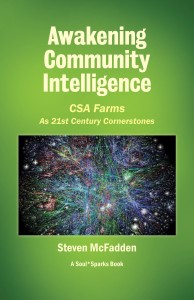Anchors in a Globalizing World
DOI:
https://doi.org/10.5304/jafscd.2016.062.008
Keywords:
Alternative Food Networks, Community Development, Community Gardening, Community Supported Agriculture, CSA, Food Justice, Urban AgricultureAbstract
First paragraph:
In the slender volume Awakening Community Intelligence, journalist and long-time community supported agriculture (CSA) advocate Steven McFadden argues for the exponential expansion of CSAs. In the face of profound, disruptive challenges in the 21st century—climate change, resource depletion, geopolitical instability—McFadden believes CSAs have the potential to become "community cornerstones" that provide "key points of stability and orientation" (p. 20). In ten very short chapters, McFadden unfolds his vision of this potential and issues a call to action.
A "cornerstone" is the central metaphor around which McFadden organizes his vision. Drawn from the craft of stone masonry, the cor-nerstone is "the base upon which other stones are set and the building takes its form" (p. 9). That base, as we look at CSA, is a specific plot of farmland with tangible connections to the natural cycles of life and to which shareholders and farmers freely tie their fates together in forms of reciprocity: the community of shareholders taking care of farmers while farmers take care of the land and nourish the community. These are the sturdy cornerstones. But McFadden's notion of community cornerstones is bigger and more dynamic than the world the stone mason metaphor conjures. It is the cosmic, scintillating image on the cover, he tells us, that captures his vision. With the help of digital networking, CSAs could become a "network of light-giving impulses"; they could serve as "a model for a dynamic, far-flung, and intelligent network of nodes" in which "community intelligence" and "land-based intelligence" is awakened (p. 10). Anchored and networked and intelligently sparking, CSAs, he thinks, can bridge the gap between the personal and the global, becoming worldwide nodes of "environmental and human health consciously woven into a network of associations" (p. 68)....
Metrics

Downloads
Published
How to Cite
Issue
Section
License
The copyright to all content published in JAFSCD belongs to the author(s). It is licensed as CC BY 4.0. This license determines how you may reprint, copy, distribute, or otherwise share JAFSCD content.











